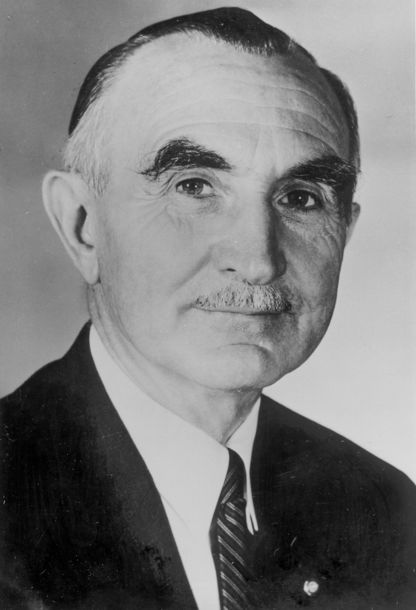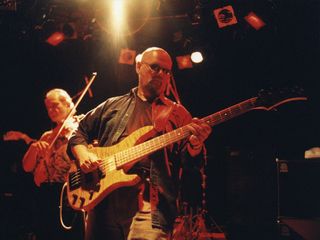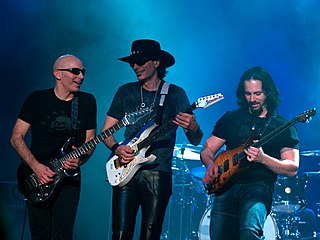See also
- Robert Morss Lovett (1870–1956), American academic
Robert Morse (1931-2022) was an American actor and singer.
Robert Morse may also refer to:

Morse code is a method used in telecommunication to encode text characters as standardized sequences of two different signal durations, called dots and dashes, or dits and dahs. Morse code is named after Samuel Morse, one of the inventors of the telegraph.

Samuel Finley Breese Morse was an American inventor and painter. After having established his reputation as a portrait painter, in his middle age Morse contributed to the invention of a single-wire telegraph system based on European telegraphs. He was a co-developer of Morse code and helped to develop the commercial use of telegraphy.

Transatlantic is a multinational progressive rock supergroup consisting of Neal Morse, Roine Stolt, Pete Trewavas and Mike Portnoy. They formed in 1999 as a side project to their full-time bands, but disbanded in 2002. They then reunited in 2009.
Faculty may refer to:
Lamp, Lamps or LAMP may refer to:
Morse may refer to:

Wayne Lyman Morse was an American attorney and United States Senator from Oregon. Morse is well known for opposing his party's leadership and for his opposition to the Vietnam War on constitutional grounds.
U.S. News & World Report is an American media company that publishes news, consumer advice, rankings, and analysis. It was launched in 1948 as the merger of domestic-focused weekly newspaper U.S. News and international-focused weekly magazine World Report. In 1995, the company launched 'usnews.com' and in 2010, the magazine ceased printing.

Robert Alan Morse was an American actor and singer, best known as the star of both the 1961 original Broadway production, for which he won a Tony Award, and the 1967 film adaptation of How to Succeed in Business Without Really Trying, and as Bertram Cooper in the critically acclaimed AMC dramatic series Mad Men (2007–2015). He won his second Tony Award for playing Truman Capote in the 1989 production of the one-man play Tru. He reprised his role of Capote in an airing of the play for American Playhouse in 1992, winning him a Primetime Emmy Award.

The Dixie Dregs is an American jazz rock band from Augusta, Georgia, formed in 1970. They released six studio albums before disbanding in 1983, and have reunited occasionally since 1988. The band's instrumental music fuses elements of rock, jazz, country, and classical music. Their recording "Take It Off the Top" was used for many years as the signature theme tune by disc jockey Tommy Vance for his BBC Radio 1 Friday Night Rock Show.

G3 is a concert tour organized by guitarist Joe Satriani featuring him alongside two other guitarists. Since its inception in 1995, G3 has toured most years and has featured many guitarists, including Steve Vai, Eric Johnson, Kenny Wayne Shepherd, Yngwie Malmsteen, John Petrucci, Robert Fripp, Paul Gilbert, Steve Morse, Steve Lukather, Uli Jon Roth, Michael Schenker, Adrian Legg, Phil Collen and many other special guests, including Tony MacAlpine, Johnny Hiland, Keith More, Chris Duarte, Andy Timmons, Neal Schon, Gary Hoey, Brian May, Billy Gibbons, Johnny A, George Lynch, Patrick Rondat, Guthrie Govan, Alejandro Silva, and Eric Sardinas.
Morse v. Frederick, 551 U.S. 393 (2007), is a United States Supreme Court case where the Court held, 5–4, that the First Amendment does not prevent educators from suppressing student speech that is reasonably viewed as promoting illegal drug use at or across the street from a school-supervised event. In 2002, Juneau-Douglas High School principal Deborah Morse suspended Joseph Frederick after he displayed a banner reading "BONG HiTS 4 JESUS" [sic] across the street from the school during the 2002 Winter Olympics torch relay. Frederick sued, claiming his constitutional rights to free speech were violated. His suit was dismissed by the federal district court, but on appeal, the Ninth Circuit reversed the ruling, concluding that Frederick's speech rights were violated. The case then went on to the Supreme Court.
Charles or Chuck Morse may refer to:
John Morse may refer to:

Francis Ormand Jonathan Smith was a U.S. lawyer, legislator, and telegraph pioneer and financier.
Samuel F. B. Morse High School is an urban public high school located in southeastern San Diego in the neighborhood of Skyline Hills serving grades 9–12 in the American K-12 education system. Morse, which serves a predominantly socioeconomically-disadvantaged student population, has produced several notable athletes among its alumni
Robert Lewis may refer to:
Morse is a surname of Flemish origin from old Frisian, and may refer to:
Steven, Stephen, or Steve Morse may refer to:
The Best Global Universities ranking by U.S. News & World Report is an annual ranking of world universities. On October 28, 2014, U.S. News, which began ranking American universities in 1983, published its inaugural global ranking, assessing 500 universities in 49 countries. That first installment of the Best Global University Ranking was published without prior announcement, with U.S. News later clarifying that the rankings of that year were a trial balloon for the publication's entrance into the global university rankings field. After pre-announcing the rankings of next year, in 2016, the periodical formalized the global university rankings as part of its regular annual programming. Having made official the ranking methodology, it disclosed that it is based on 10 different indicators that measure universities' academic performance and reputations. The ranking has since been revised and expanded to cover 1,500 institutions in 81 countries and now includes five regional and 28 subject rankings. Employing 13 indicators and based largely on data provided by Clarivate, the U.S. News global ranking is methodologically different from its ranking of American institutions; global universities are rated using factors such as research reputation, academic publications, and the number of highly cited papers.